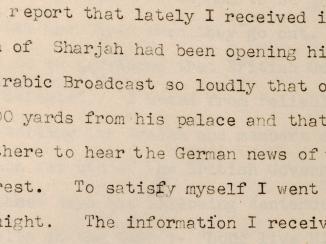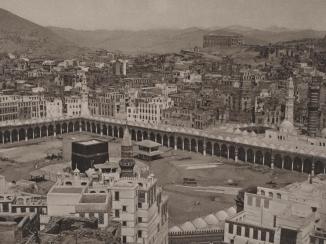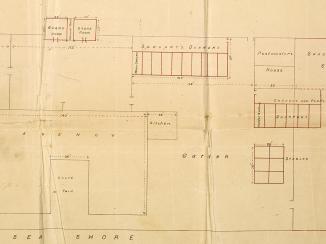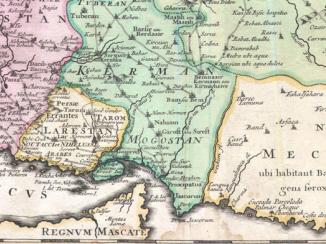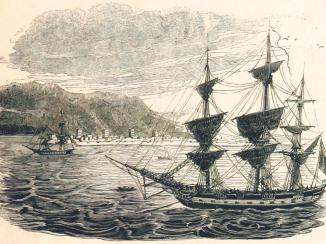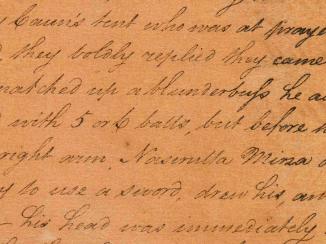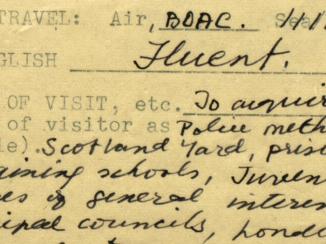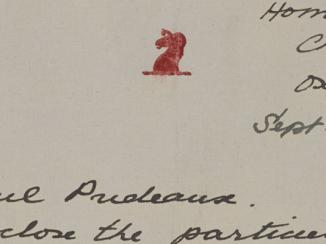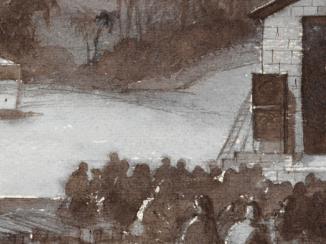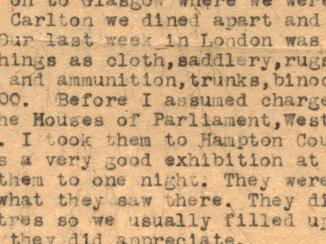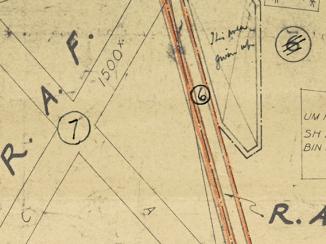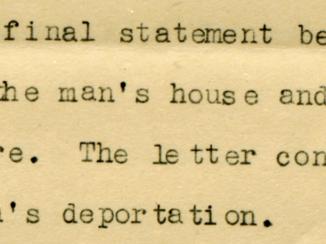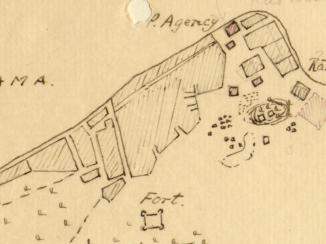Overview
In December 1926, a letter from the British Foreign Office to the India Office The department of the British Government to which the Government of India reported between 1858 and 1947. The successor to the Court of Directors. stated that on ‘political grounds it is of great importance to avoid any action which would result in the re-awakening of the controversy as to the sovereignty of Bahrein’.
At this time, the Persian Government did not recognise the sovereignty of Bahrain and claimed it as a province of Persia. The Al-Khalifa family had ruled Bahrain since 1783 when they ousted its former Bushire-based ruling family, but over 150 years later its status remained a contentious issue.
Although Bahrain was nominally independent, Britain had dictated its foreign policy since the nineteenth century and consolidated its power over the islands in 1900, with the creation of the post of British Political Agent A mid-ranking political representative (equivalent to a Consul) from the diplomatic corps of the Government of India or one of its subordinate provincial governments, in charge of a Political Agency. in Bahrain.
Avoiding Re-Awakening the Controversy
Throughout the 1920s and 1930s, Bahraini nationals resident in the city of Mohammerah (present day Khorramshahr) in Persia were subjected to harassment and intimidation by the local authorities.
Many Bahrainis in Persia – the majority of whom were Shia – had been violently forced to adopt Persian nationality in order to avoid arrest or expulsion from the country. In response, the community appealed for help to the ruler of Bahrain, Shaikh Hamad bin Isa Al Khalifa and to the various British officials who served as Political Agent A mid-ranking political representative (equivalent to a Consul) from the diplomatic corps of the Government of India or one of its subordinate provincial governments, in charge of a Political Agency. in Bahrain during this era.
The British – wary of increasing tensions with Persia over Bahrain – were hesitant in their response to the Persian Government’s actions.

Alleviating the Lot of the Baharnah
The harassment of Bahraini nationals continued and Britain’s inability or unwillingness to offer more substantial help to citizens of a country under its protection began to cause some consternation amongst the Baharna (the indigenous Shia community in Bahrain).
As Cyril Charles Johnson Barrett, the British Political Resident A senior ranking political representative (equivalent to a Consul General) from the diplomatic corps of the Government of India or one of its subordinate provincial governments, in charge of a Political Residency. in the Persian Gulf The historical term used to describe the body of water between the Arabian Peninsula and Iran. , observed in a letter to the British Legation in Tehran in August 1929, ‘it strikes the residents of Bahrain as remarkable that while Britain’s protection of their island runs to dethroning their ruler, carrying out a series of reforms and arranging to establish flying boat and aeroplane bases for herself, it is not of the least value in alleviating the lot of the Baharnah in Persia’.
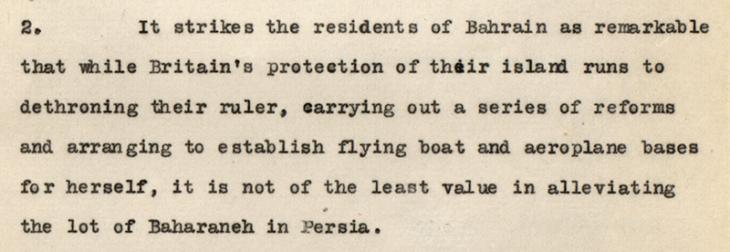
Legal Fiction
In September 1929, Charles Geoffrey Prior, the Political Agent A mid-ranking political representative (equivalent to a Consul) from the diplomatic corps of the Government of India or one of its subordinate provincial governments, in charge of a Political Agency. in Bahrain, in a letter to Barrett, his superior in Bushire, elaborated on this contradiction. In an extraordinarily frank passage, Prior described the notion that Bahrain was an independent state as a ‘legal fiction’ and stated that he did not believe that ‘any Arab is deceived for a minute by a policy which, while manipulating the resources of Bahrain in our interests, declines to protect its subjects, to allow them to protect themselves or to ally themselves with other states who might do so’.
Prior suggested that had the British intervened in any Indian state over the previous decade to the extent they had done so in Bahrain it would have caused a ‘storm of protest’:
[W]e have deposed the Ruler, deported his relations, fixed the customs tariff to suit our interests, forced the state against its will to grant a customs rebate to our ally Bin Saud […] deprived the Ruler of jurisdiction over all foreigners, and decided what Europeans he may or may not employ.
Prior went on to state that ‘we have refused the state a free hand with their mineral resources, and have been guided in the matter almost entirely by our own interests’ and points out that the ruler of Bahrain is not allowed to correspond with the oil company working on his concession except through the intermediary of the Political Agent A mid-ranking political representative (equivalent to a Consul) from the diplomatic corps of the Government of India or one of its subordinate provincial governments, in charge of a Political Agency. .
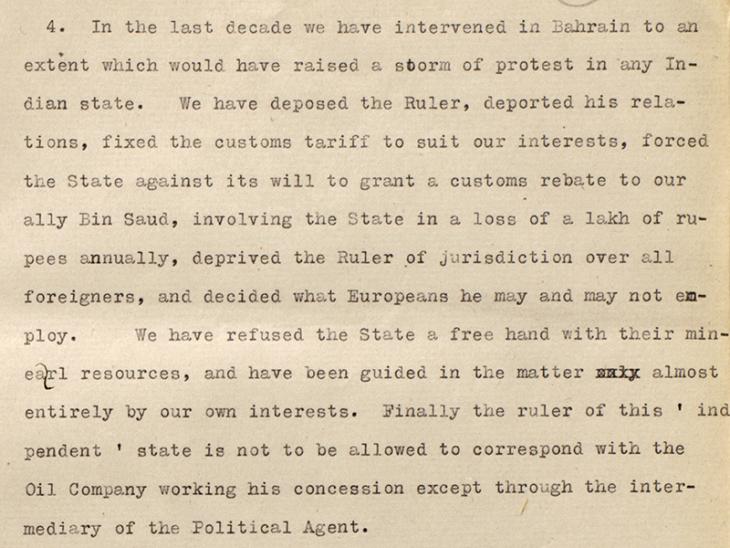
Prior also made the astonishing admission that aside from a small contribution to charity, ‘which has political value’, the British Government had incurred no expenditure in Bahrain at all.
Duty to Grant Protection
Despite his damning assessment of British policy in Bahrain, Prior believed that Britain should be fulfilling its obligations and doing more to assist the Baharna, an argument he repeated in a letter two years later in 1931.
In this letter, Prior outlined the extent of Britain’s involvement and how the British manipulated an oil company to suit their ‘Imperial interests’. He argued that since ‘we have interfered in the affairs of Bahrain to an extent unparalleled in British India [then] we should grant these people the same support and protection that we extend to inhabitants of British Indian States’.
Three years later however, the harassment of Bahrainis in Persia had not abated. In 1934, Charles Belgrave, Adviser to the Government of Bahrain, wrote that “the Persians destroy their [Bahraini] nationality papers, make them sign Persian papers yet the Baharna would rather die than become Persian subjects.”
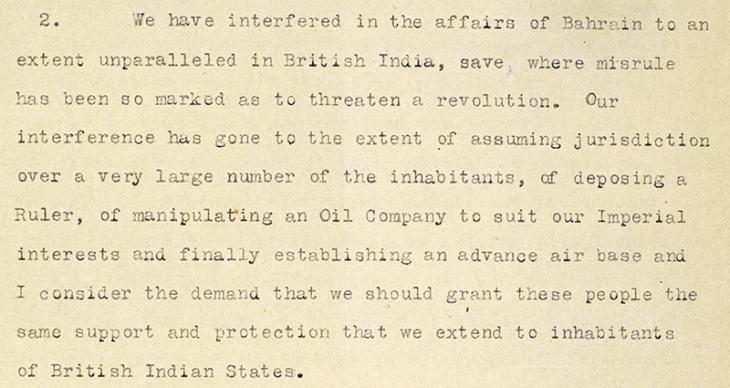
Imperial Context
It is certainly possible that Prior was genuine in his concern and that he sincerely believed the British should honour their obligations to those under their protection. But his remarkable candidness when assessing the British Government’s activities in Bahrain starkly demonstrates the nature of the British Empire’s role in the country, a role that, according to his own account, was motivated by the logic of empire and, in his own words, Britain’s self-interest.
![His Excellency The Right Honourable George Nathaniel Baron Curzon, P. C., G. M. S. I., G. M. I. E. Viceroy and Governor-General of India.' Photographer: Bourne and Shepherd [10r]. Photo 430/78/3](https://iiif.qdl.qa/iiif/images/81055/vdc_100023494119.0x000001/Photo 430_78_0001.jp2/full/,600/0/default.jpg)
In 1898, Lord Curzon, then Viceroy and Governor-General of India, famously observed, ‘Turkestan, Afghanistan, Transcaspia, Persia […] to me I confess they are pieces on a chessboard upon which is played out a game for the dominion of the world’. Bahrain was no exception to this worldview, regardless of Prior’s own personal motivations. It was another piece on the chessboard – used in order to safeguard Britain’s position in India and further the interests of its global empire.





